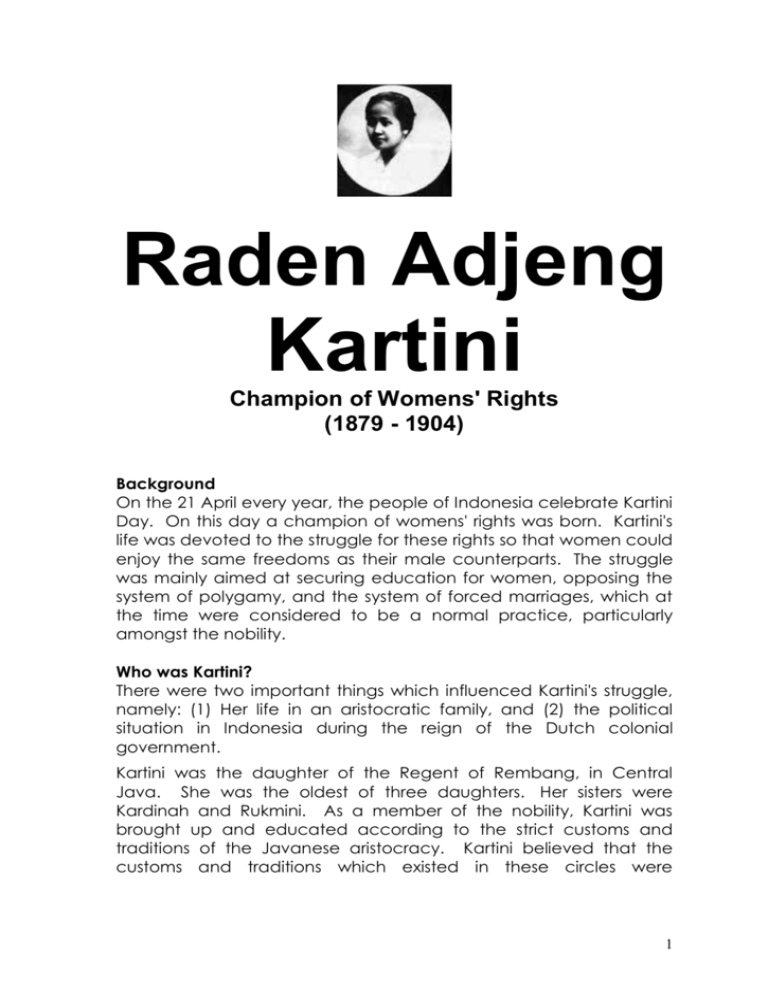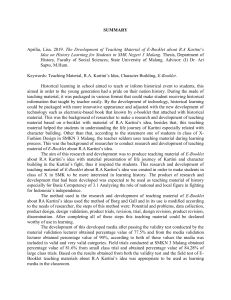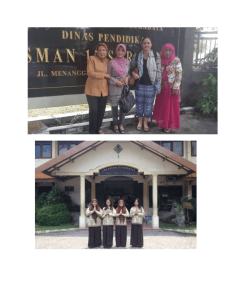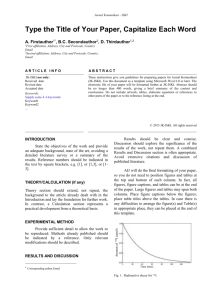Who was Kartini?
advertisement

Raden Adjeng Kartini Champion of Womens' Rights (1879 - 1904) Background On the 21 April every year, the people of Indonesia celebrate Kartini Day. On this day a champion of womens' rights was born. Kartini's life was devoted to the struggle for these rights so that women could enjoy the same freedoms as their male counterparts. The struggle was mainly aimed at securing education for women, opposing the system of polygamy, and the system of forced marriages, which at the time were considered to be a normal practice, particularly amongst the nobility. Who was Kartini? There were two important things which influenced Kartini's struggle, namely: (1) Her life in an aristocratic family, and (2) the political situation in Indonesia during the reign of the Dutch colonial government. Kartini was the daughter of the Regent of Rembang, in Central Java. She was the oldest of three daughters. Her sisters were Kardinah and Rukmini. As a member of the nobility, Kartini was brought up and educated according to the strict customs and traditions of the Javanese aristocracy. Kartini believed that the customs and traditions which existed in these circles were 1 disparaging to women. An example of this was that Kartini's mother was not her father's sole wife. Kartini was educated at a Dutch school (known as ELS or Europeesche Lagere School) which was at the same level as the Indonesian primary school. The number of Indigenous Javanese students who could attend Dutch schools was very limited because the ability to speak the Dutch language was an entry requirement. But because Kartini was part of an aristocratic family and could speak Dutch, she was easily accepted into this school. Although part of the nobility, Kartini was not conceited or arrogant. During her youth she was taught to live together with others and she soon developed an understanding of the people's suffering beneath Dutch rule. From the time that she was very young, Kartini developed a determination in her mind to free the people from their suffering. The Political Situation during Kartini's Youth When Kartini was born, Indonesia had already been colonised by the Dutch from more than two centuries. The occupation commenced with the arrival of Dutch trading companies which ultimately monopolised the spice trade in Indonesia. The Dutch colonial government in Indonesia treated the indigenous people of Indonesia cruelly. The people were pressured into growing crops of pepper and tobacco, the profits of which were channelled back to the Dutch government. Although the spice trade was initially centred on the Moluccas, it gradually spread to other areas in Indonesia, before the island of Java itself became the centre of attention. The system that was applied by the government later became known as 'Tanam Paksa' or 'forced cultivation'. But apart from the poverty and destitution brought about by Dutch oppression, the people were also faced with the tyrannical feudal customs and traditions amongst the middle and upper class. These strict rules constituted a major obstacle for the progress of their race, and resulted particularly in the arbitrary oppression of women. Feudal customs dictated that there was to be a strict division between males and females, and this was particularly discriminatory against women. A girl of nobility, whether they were from the lower or upper classes, were put into forced seclusion when they became teenagers and they were not permitted to leave home. This was a traditional law that had to be obeyed. During the forced seclusion, all contact with the outside community was cut until the time that she was married off to a man. She had no opportunity to choose 2 her husband and often he was a complete stranger to her. Often the marriage partner was much older than her and he usually had a wife or multiple wives already. After marrying and shifting to her husband's house, the secluded wife may begin to socialise with members of the community again. But because she had been in seclusion since she was a teenager, she was unable to study for a profession. As a result, she was completely reliant on her husband and he could treat her as he wished. Situations like these disturbed Kartini and made her rebel against the system. She demanded that females be permitted to study, not only to get a general education, but also to obtain trade training, so that they could possess a useful skill to provide for their own livelihood. So, her standing in the community became stronger. She was not going to be forced into marriage to support herself. She wanted to marry a man of her own choice. The birth of a revolutionary thinker, feminist and nationalist pioneer When she turned twelve and a half, the moment that she was dreading had arrived. Although her father was progressive and wanted to put his daughters through school, he still could not ignore all of the customs and traditions of the nobility. In spite of her talents, his daughter Kartini was not allowed to continue school. She was considered old enough to submit to the requirements of the ancient traditions, so she, too, was put into seclusion. During her time in seclusion, Kartini became very narrow minded, limited by the thick, strong walls of her darkened house, with windows that were always shut tight. At such a young age, she was forced to act like an adult, to become the daughter of a nobleman. This meant that she had to speak softly and finely; she wasn't allowed to laugh; she had to smile with her lips closed; she had to walk slowly; she had to curtsy and bow her head every time an older member of the family passed by; and she had to obey a host of other etiquette rules. But Kartini, with her free spirit, found it difficult to become accustomed to the rules and often did the wrong thing. Kartini was very sad and missed going to school. During her seclusion, Kartini was forced to be around adults and as a result she no longer thought like a child. Although she was still a teenager, she had to deepen her knowledge of the 'fate of women'. Her heart had not healed from the wounds inflicted by the coarse words that she often heard, like: "You're just a woman". It 3 seemed that the words "just a woman" was a common slogan which was used to point out the superiority of men. Corresponding with a close friend named Stella Kartini's family, the majority of whom were intellectual, generally respected the culture of the West. As an aristocratic family, they took the opportunity to socialise with the Dutch colonists. Many amongst them became friends of the Kartini family. This presented Kartini with a great opportunity to increase her knowledge and to learn about a foreign lifestyle. She was not going to waste it. One of the family friends was Abendanon, to whom she could pour out her feelings. The year 1899 was an important year for Kartini. She turned twenty. From her reading she knew a lot about the 'womens' movements' in Europe. She became very interested to know more about the stance and ideas of the women in Europe. She mustered the courage to put an advertisement in a Dutch magazine which indicated that she was interested in writing to European women. The advertisement caught the attention of a woman that was several years older than Kartini, Estelle Zeehandelaar from Amsterdam, who later became her close friend. Estelle, or Stella as she was known, was a Jew who married a Dutchman. From her correspondence with Stella, Kartini could describe the suffering and torment faced by women in her country. A collection of letters by Kartini to Stella and also to Mrs. Abendanon was later published by Abendanon herself. The book was called “Door Duisternis tot licht” which was later published in Bahasa Indonesian as “Habis Gelap Terbitlah Terang” ("From the Darkness comes Light") Kartini's struggle for womens' rights continued - her enthusiasm to realise her aspirations increased after her relationship with Stella. One of her goals which materialised and which is considered to be the most important, was the establishment of a school for women. The school was not only reserved for women of noble stock, but also for common people. 4










